I. The Thing on the Hearth
“The first confirmatory evidence of the thing, Excellency, was the print of a woman’s bare foot.”
He was an immense creature. He sat in an upright chair that seemed to have been provided especially for him. The great bulk of him flowed out and filled the chair. It did not seem to be fat that enveloped him. It seemed rather to be some soft, tough fiber, like the pudgy mass making up the body of a deep-sea thing. One got an impression of strength.
The country was before the open window; the clusters of cultivated shrub on the sweep of velvet lawn extending to the great wall that inclosed the place, then the bend of the river and beyond the distant mountains, blue and mysterious, blending indiscernibly into the sky. A soft sun, clouded with the haze of autumn, shone over it.
“You know how the faint moisture in the bare foot will make an impression.”
He paused as though there was some compelling force in the reflection. It was impossible to say, with accuracy, to what race the man belonged. He came from some queer blend of Eastern peoples. His body and the cast of his features were Mongolian. But one got always, before him, a feeling of the hot East lying low down against the stagnant Suez. One felt that he had risen slowly into our world of hard air and sun out of the vast sweltering ooze of it.
He spoke English with a certain care in the selection of the words, but with ease and an absence of effort, as though languages were instinctive to him — as though he could speak any language. And he impressed one with this same effortless facility in all the things he did.
It is necessary to try to understand this, because it explains the conception everybody got of the creature, when they saw him in charge of Rodman. I am using precisely the descriptive words; he was exclusively in charge of Rodman, as a jinn in an Arabian tale might have been in charge of a king’s son.
The creature was servile — with almost a groveling servility. But one felt that this servility resulted from something potent and secret. One looked to see Rodman take Solomon’s ring out of his waistcoat pocket.
I suppose there is no longer any doubt about the fact that Rodman was one of those gigantic human intelligences who sometimes appear in the world, and by their immense conceptions dwarf all human knowledge — a sort of mental monster that we feel nature has no right to produce. Lord Bayless Truxley said that Rodman was some generations in advance of the time; and Lord Bayless Truxley was, beyond question, the greatest authority on synthetic chemistry in the world.
Rodman was rich and, everybody supposed, indolent; no one ever thought very much about him until he published his brochure on the scientific manufacture of precious stones. Then instantly everybody with any pretension to a knowledge of synthetic chemistry turned toward him.




